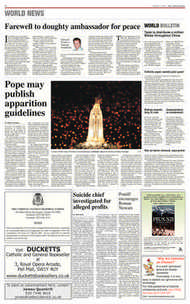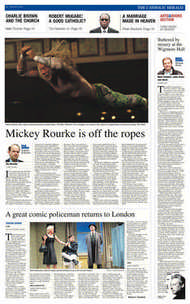Page 6, 16th January 2009
Page 6

Report an error
Noticed an error on this page?If you've noticed an error in this article please click here to report it.
Tags
Share
Related articles
Benedict Xvi Gives 'state Of The World' Address
Benedict Xvi, The First Green Pontiff
Pope Addresses ‘dramatic’ Threat Of Secularisation
Poverty Should Outrage Us, Says Pope
Benedict Xvi Calls For End To Small-arms Race
Cardinal Bertone
Pope says future of the world is at stake
BY JOHN THAVIS
POPE BENEDICT XVI has called for major efforts to reduce poverty, end regional conflicts and restore ethics to global finance.
In an annual address to the Vatican diplomatic corps the Pope also appealed on behalf of Christian minorities in places like Iraq and India, urging governments to respond firmly to an increase in antiChristian violence.
He said: “Today more than in the past, our future is at stake, as well as the fate of our planet and its inhabitants, especially the younger generation, which is inheriting a severely compromised economic system and social fabric.” After delivering his speech in the ornate Sala Regia, the 81-year-old Pontiff greeted the diplomats one by one and posed for group photographs.
The Pope’s speech, sometimes called his “state of the world” address, ranged from the refugee crisis in central Africa to Israel’s assault on the Gaza Strip. The Pope decried terrorist attacks that had “sown death and destruction” in countries like Afghanistan, Pakistan, India and Algeria, but also found hopeful signs in places like the Philippines, where the government and rebels have opened negotiations.
Taking up the theme of his world peace day message, he told diplomats that “to build peace we must give new hope to the poor”. In this“sensitive phase of the history of humanity”, he said, moral and ethical principles were crucial to improving people’s lives.
The Pope said: “How can we not think of so many individuals and families hard pressed by the difficulties and uncertainties which the current financial and economic crisis has provoked on a global scale? How can we not mention the food crisis and global warming, which make it even more difficult for those living in some of the poorest parts of the planet to have access to nutrition and water?” The Pope called for an effective strategy to fight hunger and promote local agricultural development, along with a reduction in military spending, which he said diverted enormous resources away from development. Rebuilding economic confidence, he said, would require implementing ethical principles based on human dignity – a task that was demanding, but not impossible.
He said the world was threatened not only by material poverty but also moral poverty, as seen in discrimination and violence against thousands of Christians over the last year.
Declaring that Christianity was a religion of freedom and peace, he expressed concern for Christian minorities, especially in Iraq and India, where attacks on Church communities have worsened. He urged leaders to commit themselves “to ending intolerance and acts of harassment directed against Christians, to repairing the damage which has been done, particularly to the places of worship and properties, and to encouraging by every means possible due respect for all religions, outlawing all forms of hatred and contempt”.
The Pope said he was also concerned about western society, and hoped that prejudice or hostility against Christians would not be cultivated simply because, on certain questions, “their voices cause disquiet”.
Turning his attention to the Middle East, Pope Benedict appealed for an immediate ceasefire in Gaza and the reopening of negotiations.
He said: “Once again I would repeat that military options are no solution and that violence, wherever it comes from and whatever form it takes, must be firmly condemned.” Both sides should agree to “the rejection of hatred, acts of provocation and the use of arms”.
He added that elections would be crucial in selecting leaders who could lead to reconciliation. Israel holds elections in February, and Palestinians are expected to vote for new leadership in the coming months.
In a brief reference to Iraq, the Pope encouraged Iraqis to “turn the page” and rebuild their country without discrimination on the basis of race, ethnic group or religion.
He said Iran was also important to regional and global peace, and he encouraged “tireless efforts” to negotiate a solution to the country’s nuclear programme, one that satisfies Iran’s legitimate demands and the international community’s apprehensions.
He looked ahead to his trip to Africa in March, when he will visit Cameroon and Angola, and said he was praying that Africans could build peace by fighting moral and material poverty. He said he was especially concerned about children, many of whom were refugees in Somalia, the Darfur region of Sudan, and Congo. He said there was a “glimmer of hope” in central Africa brought by a recent peace agreement in Burundi.
In Latin America, the Pope praised the commitment of some governments in waging an uncompromising battle against the drug trade and political corruption.
blog comments powered by Disqus





















